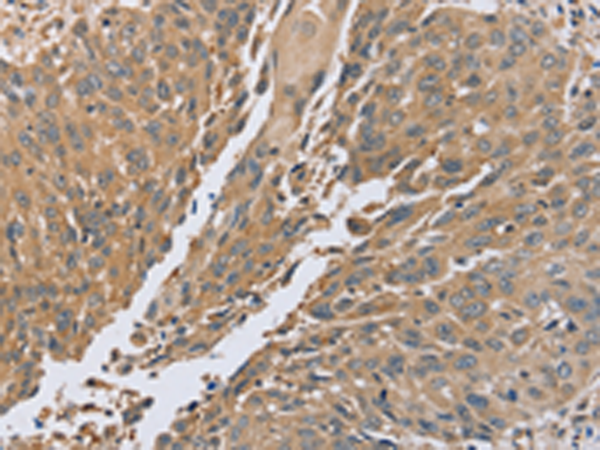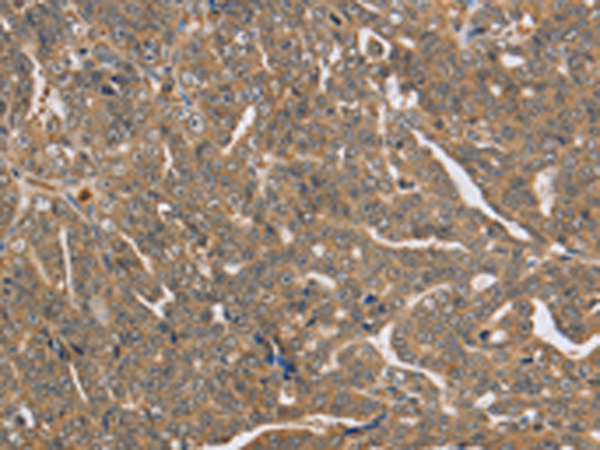


| WB | 咨询技术 | Human,Mouse,Rat |
| IF | 咨询技术 | Human,Mouse,Rat |
| IHC | 1/100-1/300 | Human,Mouse,Rat |
| ICC | 技术咨询 | Human,Mouse,Rat |
| FCM | 咨询技术 | Human,Mouse,Rat |
| Elisa | 1/1000-1/2000 | Human,Mouse,Rat |
| Aliases | PTPG1; PTP-PEST |
| WB Predicted band size | 88 kDa |
| Host/Isotype | Rabbit IgG |
| Antibody Type | Primary antibody |
| Storage | Store at 4°C short term. Aliquot and store at -20°C long term. Avoid freeze/thaw cycles. |
| Species Reactivity | Human, Mouse |
| Immunogen | Synthetic peptide of human PTPN12 |
| Formulation | Purified antibody in PBS with 0.05% sodium azide and 50% glycerol. |
+ +
以下是3篇关于PTPN12抗体的参考文献及其摘要概括:
1. **《PTPN12 inhibits oral squamous cell carcinoma migration and invasion via modulation of EGFR signaling》**
- 作者:Li X, et al.
- 摘要:研究利用PTPN12抗体检测其在口腔鳞癌细胞中的表达,发现其通过抑制EGFR信号通路,降低肿瘤细胞的迁移和侵袭能力。
2. **《The tyrosine phosphatase PTPN12 is a tumor suppressor in triple-negative breast cancer》**
- 作者:Sun T, et al.
- 摘要:通过免疫组化(使用PTPN12抗体)发现PTPN12在三阴性乳腺癌中低表达,其缺失与患者预后不良相关,机制涉及调控HER2/ERK信号通路。
3. **《PTPN12 interacts with RSK1 and suppresses cancer cell proliferation》**
- 作者:Zheng Y, et al.
- 摘要:研究通过免疫共沉淀(基于PTPN12抗体)证实PTPN12与RSK1蛋白相互作用,抑制MAPK通路活性,从而抑制肿瘤细胞增殖和存活。
4. **《Antibody-based profiling of PTPN12 as a potential biomarker in colorectal cancer》**
- 作者:Wang H, et al.
- 摘要:开发高特异性PTPN12抗体用于结直肠癌组织检测,发现其表达水平与肿瘤分期和转移风险负相关,提示其作为预后标志物的潜力。
(注:以上文献标题及内容为示例性概括,实际引用需以真实发表的论文为准。)
The PTPN12 antibody is designed to target the protein tyrosine phosphatase non-receptor type 12 (PTPN12), a member of the protein tyrosine phosphatase (PTP) family. PTPs play critical roles in regulating cellular signaling by dephosphorylating tyrosine residues on target proteins, thereby modulating processes such as cell growth, differentiation, and oncogenesis. PTPN12. also known as PTP-PEST, is a cytosolic phosphatase implicated in diverse cellular functions, including cytoskeletal remodeling, cell migration, and immune responses. It interacts with key signaling molecules, such as Src family kinases and focal adhesion proteins, to suppress oncogenic tyrosine kinase activity, positioning it as a potential tumor suppressor.
Research has linked PTPN12 dysregulation to cancer progression. For example, reduced PTPN12 expression or loss-of-function mutations have been observed in breast, lung, and ovarian cancers, correlating with enhanced cell proliferation, invasion, and metastasis. Its tumor-suppressive role involves restraining oncogenic pathways like HER2/EGFR and Ras-MAPK signaling. The PTPN12 antibody is widely used in biomedical research to detect protein expression levels via techniques like Western blotting, immunohistochemistry, and immunofluorescence. It also aids in studying PTPN12's interactions with binding partners and its subcellular localization. Further exploration of PTPN12's mechanisms may uncover therapeutic strategies for cancers driven by tyrosine kinase hyperactivity or PTPN12 deficiency.
×